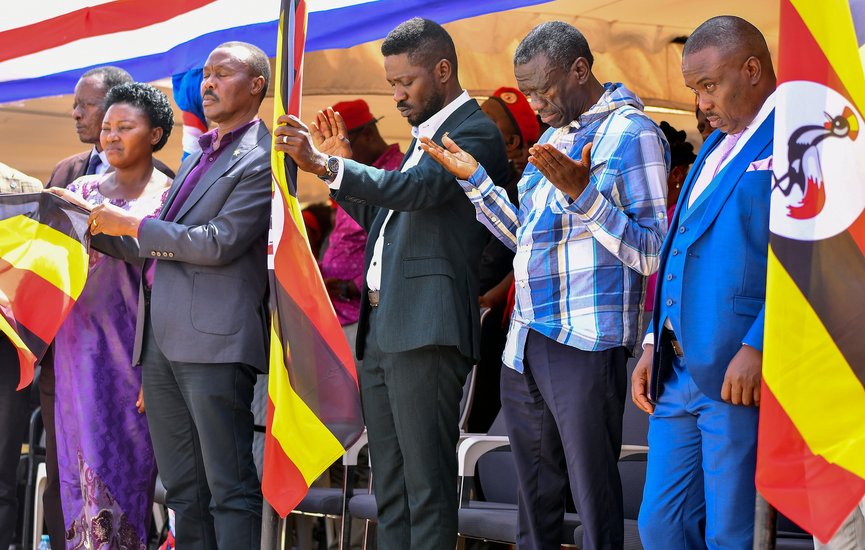KAMPALA — Uganda’s opposition is exploring an unprecedented strategy to challenge President Yoweri Museveni in the 2026 general elections: a coordinated “twin candidature” featuring both Maj. Gen. (Rtd) Mugisha Muntu and pop star-turned-politician Robert Kyagulanyi, better known as Bobi Wine.
This emerging plan is the result of intensified coalition talks among the People’s Front for Freedom (PFF), the Alliance for National Transformation (ANT), and the National Unity Platform (NUP), aimed at uniting the opposition against Museveni’s 40-year grip on power.
In a statement released Monday, the PFF confirmed it would not field its own presidential candidate, instead pledging full support for a unified front. The group revealed that discussions had progressed to the point of considering either a single opposition flag bearer or a “twin freedom candidature” featuring both Muntu and Kyagulanyi running under a coordinated alliance.
“We are fully committed to building a single, stronger freedom-seeking force,” the PFF said. “Our parties may resolve to present twin freedom candidates if consensus is reached.”
The ANT is said to be behind the twin candidature idea, viewing Muntu and Bobi Wine as complementary figures who could mobilize support across Uganda’s deeply divided political landscape. Muntu, a former army commander and moderate politician, commands respect in the western region and among older voters, while Bobi Wine has broad appeal among urban youth and in central Uganda.
However, the NUP has maintained that fielding one unified candidate is the most effective strategy to prevent vote splitting, an issue that has historically hampered the opposition. In 2016, a failure to unite behind a single challenger saw former Prime Minister Amama Mbabazi and opposition veteran Dr. Kizza Besigye run separately, a division widely believed to have handed Museveni a comfortable win.
Opposition leaders say the 2026 elections may prove even more volatile. The PFF raised alarm over the alleged militarization of the electoral process and ongoing abductions of opposition members, warning that Uganda is on the brink of its “worst election in history.”
“There is no credible voter register,” the PFF alleged, accusing the Museveni regime of manipulating the electoral calendar and using state machinery to suppress dissent.
In a significant move, the PFF announced that four-time presidential contender Dr. Kizza Besigye would lead the coalition’s national campaign coordination team, despite currently being detained on treason charges. Besigye is expected to play a pivotal role in mobilizing regional and parliamentary campaigns under the coalition umbrella.
Meanwhile, coalition negotiations are expected to resume after NUP completes its internal candidate vetting. Should talks collapse, the PFF has indicated it will chart its own path, announcing its decision before presidential nominations close.
The idea of a Muntu–Bobi Wine ticket has already sparked debate in political circles. Analysts suggest the dual candidacy could stretch the ruling party’s campaign apparatus and present a more dynamic alternative to Museveni’s incumbency. Drawing comparisons to U.S.-style presidential tickets that balance regional and ideological interests, the strategy could boost opposition momentum if carefully executed.
Still, major hurdles remain. Reaching consensus among opposition leaders has proven elusive in the past, and internal rivalries, legal battles, and logistical challenges could derail the plan.
What remains clear is that the race for 2026 is already taking shape — and the opposition is signaling it won’t approach this one divided.
